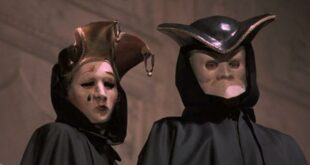Stuff Black People Don’t Like
November 21, 2015
Can you spot the great quote from this immortal passage in Nicholas Lemann’s The Promised Land: The Great Black Migration and How It Changed America?:
Chicago was home to the Chicago Defender, the country’s leading black newspaper, with a wide readership in the rural South. Robert S. Abbott, the Defender’s publisher, a small, round, well-dressed man who artfully combined the roles of race crusader and businessman, launched what he called “The Great Northern Drive” on May 15, 1917. The object of the drive was to exhort Southern blacks to come to Chicago, in order to make money and live under the legal benefits of citizenship. Abbott invented slogans (“The Flight Out of Egypt”) and promoted songs (“Bound for the Promised Land,” “Going Into Canaan”) that pounded home a comparison to the events described in the Book of Exodus for his audience of extremely religious children of slaves.
He persuaded the railroads to offer “club rates” to groups of blacks migrating to Chicago. At the same time strong-back businesses like the stockyards and packing houses, desperately short of labor because of the war, hired white labor agents and black preachers to tour the South recruiting. Black porters on the Illinois Central, who at the time were a prosperous, respected elite in black America, spread the word (and passed out the Defender) on their stops in Mississippi towns. E. Franklin Frazier, the black sociologist, reported that, “In some cases, after the train crossed the Ohio River, the migrants signalized the event by kissing the ground and holding prayer services.”
The black population of Chicago grew from 44,000 in 1910 to 109,000 in 1920, and then to 234,000 in 1930. A local commission on race relations reported that 50,000 black people had moved to Chicago from the South in eighteen months during the war. — p. 16
Did you see it?
Here.
I’ll make it easy for you. As black migrants from the South entered the northern portion of the United States, they rejoiced at the their new found freedom:
“In some cases, after the train crossed the Ohio River, the migrants signalized the event by kissing the ground and holding prayer services.”
Blacks kissed the ground and held prayer services after they were liberated from the chains of Jim Crow and the white supremacist culture of the South.
Well, less than a century later, this is the type of world liberated, free blacks have created in their promised land. [CHICAGO WOMAN CALLS FOR SEX STRIKE TO STOP GUN VIOLENCE, ABC 7 Chicago, 11-16-15]:
A South Side woman is on a mission to help stop the violence in Chicago by calling for a sex strike.
It may sound outlandish, but this isn’t the first time such an idea has been raised. It’s even the premise of the new movie “Chi-Raq”.
With Chicago reeling from an autumn of gun violence, seeing a mostly-male crowd camped out for a new shoe store recently left April Lawson enraged.
“You’re watching these guys just like buying gym shoes and carrying on like life is normal,” Lawson said. “Then I saw the trailer to ‘Chi-Raq’.”
The new Spike Lee film is about a plan by neighborhood women to withhold sex until gun violence ends.
“We’re going to make sure these fools put down these guns,” a character in the trailer says.
Lawson, a mother and activist from Auburn Gresham, started an online petition asking women to sign onto this pledge:
“I vow to stay celibate until black men organize and create a strategy to keep the peace in our neighborhoods,” Lawson read.
What “Chi-Raq” and Lawson are proposing is nothing new. The film, in fact, is based on an ancient Greek fable. And in recent years, similar boycotts in other countries have been used to promote social and political causes.
“If you decide to silently protest,” Lawson said. “It might get them to think.”
There’s really not much else to say, is there?
Freedom failed.
 Daily Stormer The Most Censored Publication in History
Daily Stormer The Most Censored Publication in History


